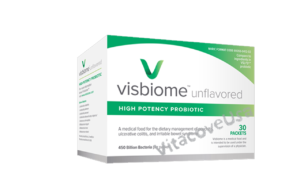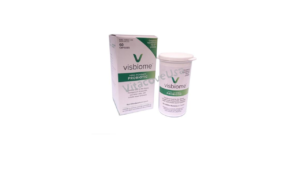New Visbiome study published in the International Journal of Molecular Sciences found that a probiotic formulation decreased inflammation in the cerebrospinal fluid, which is associated with neurocognitive disorders in people living with HIV. Almost half of people with HIV will experience some form of neurocognitive disorder. This disorders are ranging from mild forms of HIV-associated neurocognitive disorders to severe dementia. The major contributing factor to neurocognitive degeneration is inflammation.
New Visbiome study showed that an imbalance of the gut microbiome (dysbiosis) caused by HIV can create a weakening of the lining of the intestinal tract as well as cause a disruption of the Gut-Associated Lymphoid Tissue (GALT), which allows bacteria to seep into the bloodstream. This is called microbial translocation. The immune system’s response to newly introduced bacteria creates a constant state of inflammation. Inflomation is carried throughout the body, including the brain. The persistent inflammation is believed to be a cause of neurocognitive disorders.
New Visbiome research has identified the importance of the gut microbiome (GBA). The GBA consists of bidirectional communication between the central and the enteric nervous system, which links the cognitive and emotions centers of the brain with peripheral intestinal functions. Simply put, the GBA is the connection from the brain to the gut and vice versa and it’s existence is why we can get a stomach ache when we’re nervous or feel “butterflies” in our stomach when we’re in love. It may also link changes in the gut microbiome, which cause dysbiosis, to neurocognitive degeneration.
Researchers at the University of Rome hypothesized that the consumption of Visbiome may alter the GALT microbiome, restoring a healthy balance of bacteria and correcting the state of dysbosis, thus eliminating or reducing neurological inflammation. Researchers also found that the probiotic improved the metabolism of tryptophan as well as an amino acid. Amino acid is a necessary component to the human diet.
New Visbiome study conclusion:
When used, Visbiome reduced CNS inflammation and improved the metabolism of tryptophan by reducing IDO, and stimulating the synthesis of serotonin which is formed from tryptophan and is a vital neurotransmitter-like chemical. Visbiome probiotic used in study, is a highly concentrated probiotic mix that contains seven strains of 1,800 billion live bacteria. These strains are a mix of Lactobacillus acidophilus, Lactobacillus plantarum, Lactobacillus bulgaricus, Lactobacillus paracasei, Bifidobacterium breve, Bifidobacterium longum, Bifidobacterium infantis as well as Streptococcus thermophiles.


